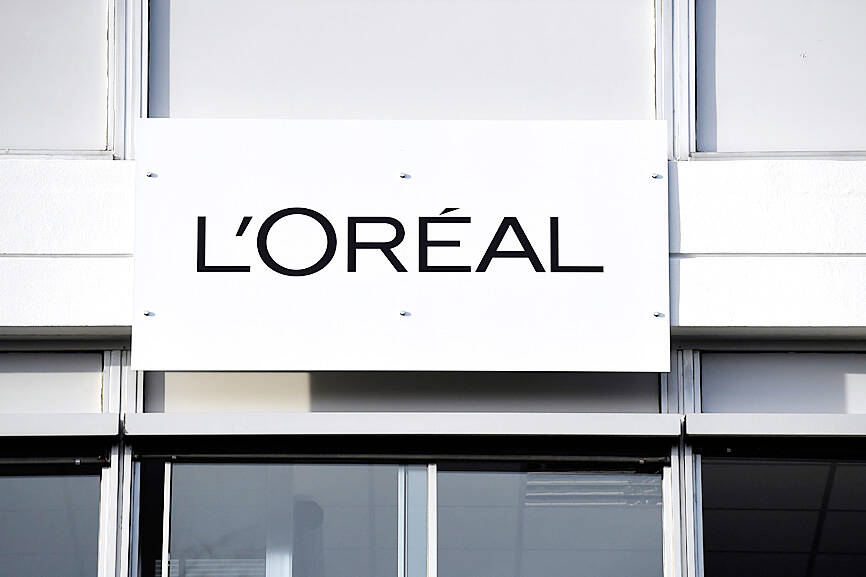L’Oreal SA sales disappointed as the owner of Lancome suffered from a decline in shopping by Chinese travelers.
Sales at the cosmetics group rose 6.9 percent on a like-for-like basis in the fourth quarter of last year, the French company said on Thursday, trailing estimates. Revenue from North Asia dropped 6.2 percent, while analysts had expected it to be little changed.
“The key question here will be how long China remains soft,” Morgan Stanley analyst Sarah Simon said in a research note. She expects tough comparisons in the first half of the year and “a much better picture” in the second half.

Photo: AFP
The performance in North Asia, which includes China and South Korea, continued to suffer from a challenging travel retail market, which weighed in particular on its premium unit, L’Oreal Luxe. That division includes labels such as Lancome and the recently integrated Aesop, which L’Oreal bought last year.
“North Asia continued to be impacted by the reset in Travel Retail following the change in policy regarding ‘daigous,’” the company said, referring to the practice of Chinese tourists buying on behalf of others when traveling.
Despite the drag from Asia, L’Oreal’s resilience stands in contrast to its US rival Estee Lauder Cos, which earlier this week announced plans to cut as much as 5 percent of its workforce as it loses market share.

Photo: Reuters
L’Oreal’s dermatological beauty unit, which includes labels such as La Roche-Posay, grew by 27 percent and topped estimates. North America sales also beat expectations.
The company will continue to outperform the beauty market, L’Oreal chief executive officer Nicolas Hieronimus said in the statement.
Separately, Hermes International SCA’s sales surged at the end of last year as the Birkin bag maker weathered the slowdown in demand for luxury goods with its unique model driven by scarcity.
Fourth-quarter revenue climbed 17.5 percent at constant exchange rates, Hermes said in a statement yesterday.
The company also announced plans for an exceptional dividend of 10 euros a share.
Despite a cooling in demand for luxury products following the post-pandemic boom, Hermes’ brand still lures wealthy customers willing to splurge on its hard-to-get handbags and pricey silk scarves. All the main divisions of the Paris-based company grew by at least 10 percent.
In a call with reporters, Hermes executive chairman Axel Dumas said the company plans product price hikes of 8 percent to 9 percent on average this year.
Recurring operating income for the year rose to 5.65 billion euros (US$6.1 billion), topping analysts’ estimates.

Hon Hai Precision Industry Co (鴻海精密) yesterday said that its research institute has launched its first advanced artificial intelligence (AI) large language model (LLM) using traditional Chinese, with technology assistance from Nvidia Corp. Hon Hai, also known as Foxconn Technology Group (富士康科技集團), said the LLM, FoxBrain, is expected to improve its data analysis capabilities for smart manufacturing, and electric vehicle and smart city development. An LLM is a type of AI trained on vast amounts of text data and uses deep learning techniques, particularly neural networks, to process and generate language. They are essential for building and improving AI-powered servers. Nvidia provided assistance

DOMESTIC SUPPLY: The probe comes as Donald Trump has called for the repeal of the US$52.7 billion CHIPS and Science Act, which the US Congress passed in 2022 The Office of the US Trade Representative is to hold a hearing tomorrow into older Chinese-made “legacy” semiconductors that could heap more US tariffs on chips from China that power everyday goods from cars to washing machines to telecoms equipment. The probe, which began during former US president Joe Biden’s tenure in December last year, aims to protect US and other semiconductor producers from China’s massive state-driven buildup of domestic chip supply. A 50 percent US tariff on Chinese semiconductors began on Jan. 1. Legacy chips use older manufacturing processes introduced more than a decade ago and are often far simpler than

STILL HOPEFUL: Delayed payment of NT$5.35 billion from an Indian server client sent its earnings plunging last year, but the firm expects a gradual pickup ahead Asustek Computer Inc (華碩), the world’s No. 5 PC vendor, yesterday reported an 87 percent slump in net profit for last year, dragged by a massive overdue payment from an Indian cloud service provider. The Indian customer has delayed payment totaling NT$5.35 billion (US$162.7 million), Asustek chief financial officer Nick Wu (吳長榮) told an online earnings conference. Asustek shipped servers to India between April and June last year. The customer told Asustek that it is launching multiple fundraising projects and expected to repay the debt in the short term, Wu said. The Indian customer accounted for less than 10 percent to Asustek’s

Gasoline and diesel prices this week are to decrease NT$0.5 and NT$1 per liter respectively as international crude prices continued to fall last week, CPC Corp, Taiwan (CPC, 台灣中油) and Formosa Petrochemical Corp (台塑石化) said yesterday. Effective today, gasoline prices at CPC and Formosa stations are to decrease to NT$29.2, NT$30.7 and NT$32.7 per liter for 92, 95 and 98-octane unleaded gasoline respectively, while premium diesel is to cost NT$27.9 per liter at CPC stations and NT$27.7 at Formosa pumps, the companies said in separate statements. Global crude oil prices dropped last week after the eight OPEC+ members said they would